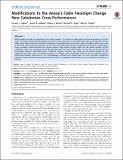Modifications to the Aesop's Fable paradigm change New Caledonian crow performances
Abstract
While humans are able to understand much about causality, it is unclear to what extent non-human animals can do the same. The Aesop's Fable paradigm requires an animal to drop stones into a water-filled tube to bring a floating food reward within reach. Rook, Eurasian jay, and New Caledonian crow performances are similar to those of children under seven years of age when solving this task. However, we know very little about the cognition underpinning these birds' performances. Here, we address several limitations of previous Aesop's Fable studies to gain insight into the causal cognition of New Caledonian crows. Our results provide the first evidence that any non-human animal can solve the U-tube task and can discriminate between water-filled tubes of different volumes. However, our results do not provide support for the hypothesis that these crows can infer the presence of a hidden causal mechanism. They also call into question previous object-discrimination performances. The methodologies outlined here should allow for more powerful comparisons between humans and other animal species and thus help us to determine which aspects of causal cognition are distinct to humans.
Citation
Logan , C J , Jelbert , S A , Breen , A J , Gray , R D & Taylor , A H 2014 , ' Modifications to the Aesop's Fable paradigm change New Caledonian crow performances ' , PLoS One , vol. 9 , no. 7 , 103049 . https://doi.org/10.1371/journal.pone.0103049
Publication
PLoS One
Status
Peer reviewed
ISSN
1932-6203Type
Journal article
Collections
Items in the St Andrews Research Repository are protected by copyright, with all rights reserved, unless otherwise indicated.

